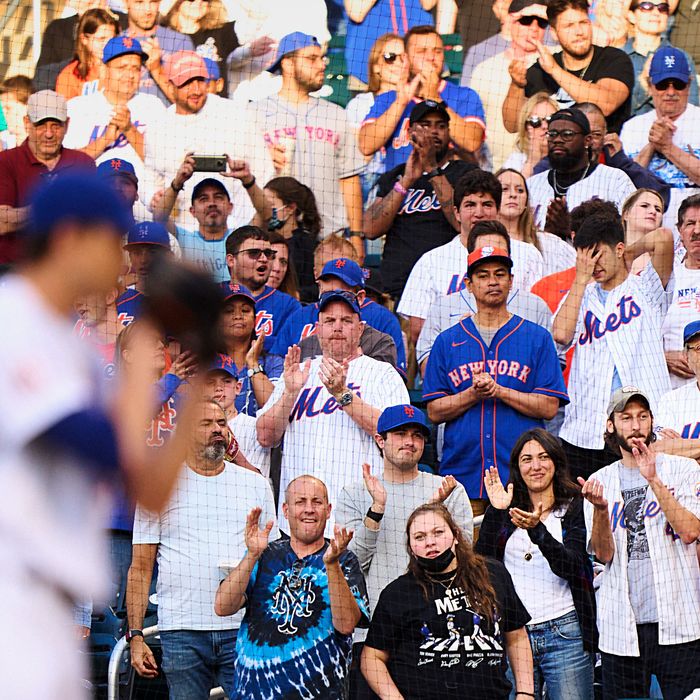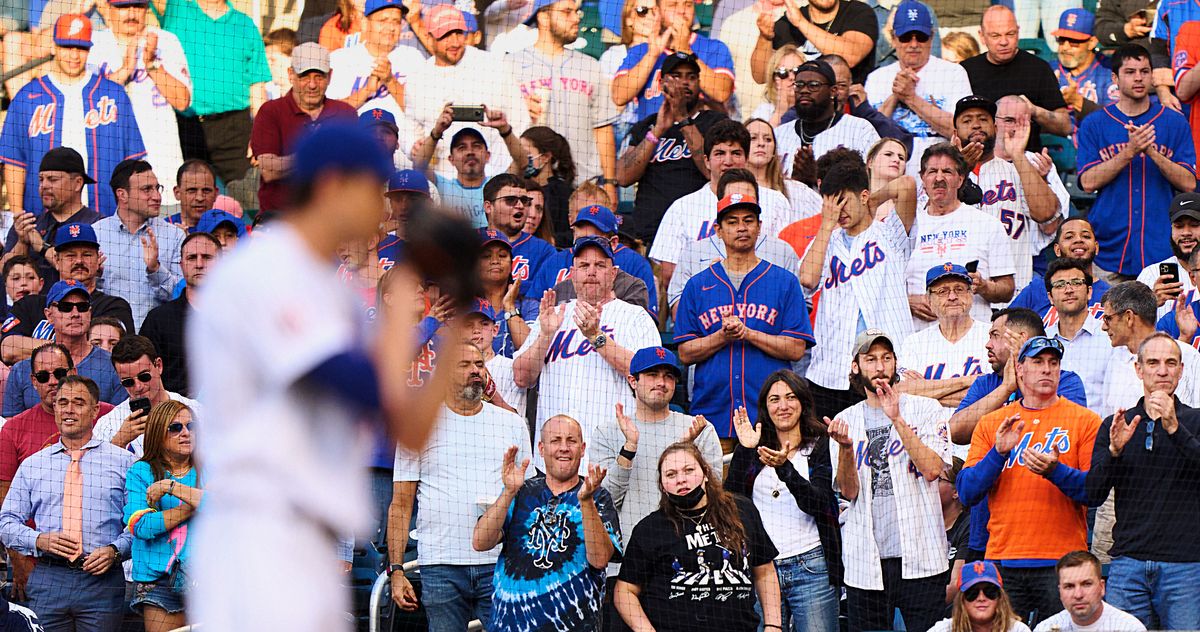
Until the Mets reportedly settled on former Angels general manager Billy Eppler as their new general manager Monday night, we had reached the point of their Mets’ desperate search for a GM that if you had not personally received an invitation to interview, they must have had your old number. As many as 12 different candidates for the job refused to even meet with the Mets, and their inability to find someone to fill what should, theoretically, be one of the most desired jobs in the sport (there are only 30 general managers in the Majors, after all) had become one of baseball’s running jokes. Though considering someone needs to be in charge of all the offseason moves the team clearly needs to make — assuming baseball’s looming labor fight doesn’t wipe out the offseason all together — you can forgive Mets fans for not laughing.
There are an abundance of reasons that the Mets had trouble filling the job, from notoriously tweet-happy owner Steve Cohen to the fact that team president Sandy Alderson’s son Bryn is already an assistant general manager (no one wants the boss’s son reporting back constantly) to what sure appears to be a nightmare of a human resources problem: the team’s last GM was fired for a DWI after a team function and one of its previous managers has been banned from baseball for sexual misconduct. This is not exactly a situation that smells of harmony. But last week, Alderson tossed out another theory.
“I think it’s mostly about New York, and not about, you know, Steve or the organization or what have you,” Alderson said to reporters. “It’s a big stage, and some people would just prefer to be elsewhere.”
This was a nifty bit of misdirection by Alderson, to imply that the reason the Mets have such a bad reputation is not because of the behavior and judgment of the people who work for them, but because of the habit of fans and media in New York City have of calling them out for that behavior and judgment. But he’s also right. No sane sports executive, or even a star player, should ever choose to ply their trade in New York City. If they have the choice, I’d argue they should pick literally anywhere else.
Look, I love New York City and (for the most part) its sports teams. I lived in New York for nearly 14 years; I’m obsessed with the Knicks (someday, Immanuel Quickley and I are going to be best friends, you watch); and I have been to so many Fordham basketball games that Mike Breen once told me he remembered seeing me at one of them. I consider the Jeremy Lin fortnight one of the most fun experiences I’ve ever had in sports; for God’s sake, I’ve been to a freaking Wagner game in Staten Island. It’s a great sports town! But if you’re a player and you can go elsewhere, you absolutely should.
Here’s why:
1.
The Money Isn’t Better Anymore
For a long time, the pure spending power of New York City sports teams, which have bigger revenue streams than many competitors, was enough. The Yankees could pay more than anyone else, so of course that’s where you’d go. (Money is a pretty nice thing to have, after all.) But those days are over.
The NFL, NBA, WNBA, MLS, and NHL all have salary caps, which means each team can only pay its players so much. Some teams can go over the cap by paying a “luxury tax” — that’s why the Brooklyn Nets have the second-largest payroll in the NBA — but that’s almost always a result of the usually short-term condition of having multiple superstars on your team. (And superstars don’t get paid more by New York teams than they do by any others.) These days, even the Yankees and Mets play the cost-control game. The Yankees do have the second-highest payroll in baseball — the Mets are third — but there were only two individual New York players, the Mets’ Francisco Lindor and the Yankees’ Gerrit Cole, among the top-ten highest-paid baseball players last year. The reason the Yankees’ payroll is so high is that they have a surplus of good players, not that they pay individual superstars an inordinate amount of money. (The Yankees have only one other player in the top-40 highest salaries, Giancarlo Stanton, whose contract was originally signed by the Marlins.) The Yankees can’t — and don’t, and probably won’t — just outspend every other team to get whoever they want anymore. There’s enough money in baseball, and all sports, for nearly every team to pay the top salary in the sport. (The top-two highest-paid players next year play in Anaheim.) And this isn’t even accounting for the fact that some states, like Florida or Texas, have no income tax. If you earn the exact same salary in Orlando as you do in New York, you’re going to make about 10 percent more in Orlando.
2.
The Media
I do not believe members of the New York City media — television, radio, print, website, newsletter, sea scroll, whatever — are more obnoxious, deceptive, or immoral than any other city’s sports scribes: We’re all snakes, after all. But there are more snakes in New York. A lot more.
To visit a press box in, say, Cincinnati, is to wave to two or three other reporters and then be blissfully left alone for three hours. New York remains, by far, the most competitive media market in the country, perhaps the world. What that competition means for you, the superstar athlete, is that you will never be left alone. You will be an endlessly renewable resource for scoops, and the media will get some scoops, at your expense. They will also — post-COVID, anyway — be constantly lined up outside your locker, asking you all sorts of difficult questions about how you just struck out or missed a key three-pointer and whether or not that means you are mentally tough enough to play in New York City. If you say one wrong word, you will not only be splashed across the back page of the city’s tabloids, you will also become fodder for the rest of the country’s sports media, because there are more people who cheer for New York City sports teams than any other city’s sports teams and thus, every national media organization will milk your misstep or triumph for every click and view they can get. (East Coast bias is real!)
In St. Louis recently, the Cardinals fired their successful manager under mysterious, confusing circumstances, but the team stonewalled requests for an explanation, and after about a week, everyone just shrugged their shoulders and said, “Well, I guess we’ll never know what happened!” In New York, five reporters would have gnawed each other’s children’s legs off to get to the bottom of the story. If you’re the kind of athlete who likes peace, you won’t get a moment of it in New York. You will be on record every minute of every day. And even if you do everything right, the media might still kill you. Sorry. Scoops gotta scoop.
3.
Seriously, You’ll Never Really Be Left Alone
Some athletes have said they enjoy playing in New York because the city is so large and its citizens so generally diffuse (and unimpressed by casual celebrity) that most people don’t know or care who they are. (There’s no way Giannis Antetokounmpo can walk around downtown Milwaukee without being mobbed.) But that’s only the case if everything’s going well. If it’s not, construction workers are going to be informing you that you suck all day. And if you ever go out for a night on the town, know that not only you will be a target for drunk idiots (which happens everywhere), but that if you so much as smirk at one of them, you’ll be in “Page Six” the next day. The celebrity media is an added burden here. Remember, Mike Piazza once felt the need to call a press conference to say that he was not gay — he had a live press conference about it! — solely because a “Page Six” editor got a random blind item and did a terrible job vetting it. Safe to say, that’s not happening in Kansas City.
4.
The Fans Are Just Waiting to Boo You
Francisco Lindor is one of the best, most joyous players in baseball: I feel pretty confident saying that, up until 2021, he had never been booed by his home fans in his entire life. Then he came to the Mets. By the tenth game he played for the team, the Citi Field crowd was all over him. “Getting booed sucks, man,” Lindor said. “It’s not fun. It’s a lonely feeling, especially when it’s your home crowd.” Fans eventually came around on Lindor once he started hitting, but he has nine more years on one of the priciest contracts in baseball; there are many, many more jeers to come. New York City sports fans aren’t the only fans who boo their own players, of course, but they have the quickest, itchiest trigger fingers.
5.
Winning Only Buys You a Little Time
The most common argument people make for playing in New York City is that while fans are tough on you, there’s no place better to win. If you triumph in New York, you’ll be showered with love like in no other city. I am not necessarily sure this is true — sure looks like people lost their shit in Atlanta when the Braves won the World Series and in Milwaukee when the Bucks won the NBA Finals. Granted, not a lot of cities go out “bing-bong”ing just because they prevailed in the first game of the year, but the idea that every New York City athlete who wins a championship is a legend forever is not supported by the facts. Here are New York City athletes who have won a title in this city: Alex Rodriguez. Robinson Canó. Eli Manning. Tom Coughlin. Plaxico Burress. Statues weren’t built for these men. Every single one of them, in fact, was run out of town, disgraced by scandal, lack of production, or both. Sure, if you’re Lawrence Taylor or Mark Messier or Derek Jeter or Mariano Rivera, yeah, winning in New York City gives you a lifetime pass. (Though I’m not sure those four wouldn’t have earned just as much eternal love had they won in any other city.) But for everybody else, all winning does for you is buy you a few months until fans demand you win it all again. Someone once asked George Carlin what “doing cocaine felt like.” He said, “It makes you feel like doing more cocaine.” That’s what winning in New York City feels like: like there’s never enough.
Look, I want a Knicks championship just about as badly as anybody wants anything. But I’m a 46-year-old man who has sunk half his life into the team. A 23-year-old superstar athlete — or a whiz-kid sports executive with his or her choice of jobs — has no such emotional connection. They can just look at the facts of the situation. And those facts make it clear: If you can make it in New York, you can make it anywhere. And you probably should.

